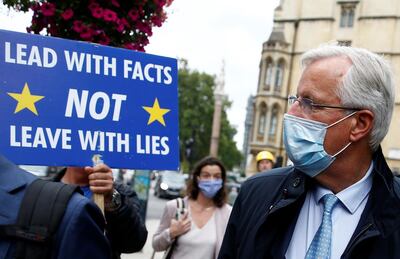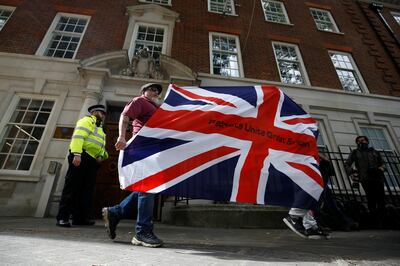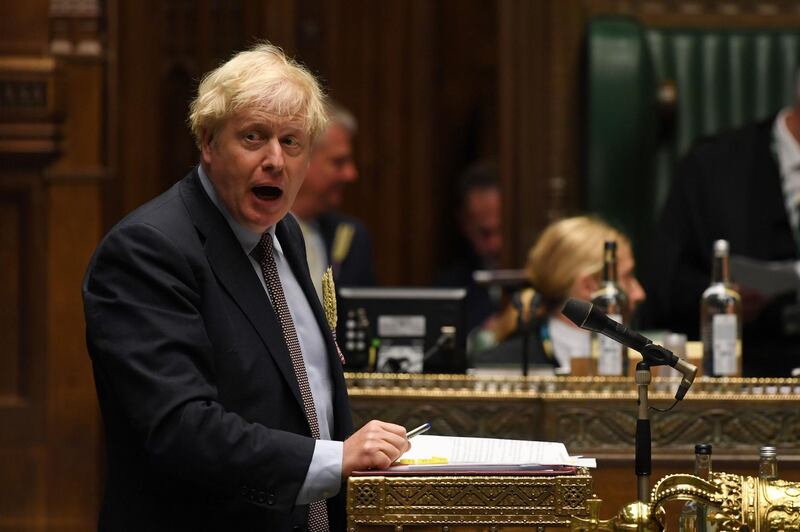The biggest mistake anyone dealing with Boris Johnson can make is to assume he has a political ideology, a philosophy or even a plan. Instead he has a style, and what one could call a pathology.
This is important because nothing the UK’s current Prime Minister does and no agreement he makes can be interpreted in the assumption that he has any fixed goals beyond his own, short-term advantage. And so the astonishing threat that the UK is planning to renege on a deal negotiated and accepted in good faith on how to leave the EU needs to be seen not only in political or legal terms but in terms of Mr Johnson’s psychology.

Ask British people which leader of the past century they most admire, and Winston Churchill is top of the list. The former Conservative prime minister Margaret Thatcher is also held in high regard, even by many of those who despised her politics.
Ms Thatcher, generally, said what she was about to do and then did it. She was clear that she was prepared to let Irish hunger strikers die in jail if that was the method of protest they chose. She was resolute that striking coal miners would be resisted. She refused to accept that Argentina could annex the Falkland islands by force. All three of these Thatcher policies, and many more, were stubbornly implemented and divisive, but at least what you saw with the Iron Lady was what you were going to get. When asked about doing a U-turn she told her Conservative party conference in 1980: “You turn if you want to. The lady is not for turning.”
Mr Johnson, however, has been at the centre of more U-turns than a hill climb on the Tour de France. He has turned and turned again on coronavirus measures, for instance. The Iron Lady has been succeeded by Jelly Johnson, who wobbles when under pressure and yet manages to explain it away because, in the end, few people (including Conservative MPs) really believe what he says.
Astoundingly, to Ulster unionists – after a few hours meeting with Ireland’s prime minister Leo Varadkar in October 2019, Mr Johnson suddenly announced he was prepared to accept a customs border between Northern Ireland and the rest of the UK. This U-turn ensured that Mr Johnson got what he called “an oven-ready deal” on leaving the EU. That supposed “deal” ensured he won the December 2019 General Election with a whopping 80-seat majority.

But the problems were immediately obvious. While, Ms Thatcher asserted that Northern Ireland was as British as her north London constituency of Finchley, Mr Johnson (in customs terms) made Northern Ireland about as British as the Irish Republic. Since he represents “the Conservative and Unionist Party”, many genuine unionists feared this will lead inevitably to the breakup of the United Kingdom.
Since I am currently engaged on writing a book on that very subject, I agree. The UK as currently constituted may not survive Mr Johnson’s blunders. But now, to get out of his self-created mess, he has plunged into a deeper pit.
Mr Johnson’s Northern Ireland Secretary Brandon Lewis has admitted that reneging on the EU deal on Northern Ireland “does break international law in a very specific and limited way”. A bank robber steals money in a very specific and limited way.
Trying to excuse inexcusable law-breaking, Mr Johnson’s spokesman claimed that “the withdrawal agreement and Northern Ireland protocol … was agreed at pace at (sic) the most challenging political circumstances". In other words, Mr Johnson was so desperate to get a deal he would have agreed to anything, and like many of his other decisions, reality eventually bites. Or as the Speaker of the US House of Representatives Nancy Pelosi put it: “If the UK violates its international agreements and Brexit undermines the Good Friday accord (which brought peace to Northern Ireland) there is absolutely no chance of a US-UK trade deal passing the Congress.”
To say European Union negotiators are furious is an understatement. Even Conservative MPs are publicly critical. Roger Gale, a veteran MP from Kent, tweeted that Mr Johnson’s “oven-ready deal now appears to have been half baked”.
This will not end well. My hunch is that Conservative MPs will tolerate Mr Johnson up until the UK leaves the EU with a deal, or else they will opt to crash out with no deal and blame Mr Johnson for the mess. But I could be wrong. The Iron Lady’s successor Jelly Johnson may yet wobble again, turn again, and tell us, once more, that it has all been a “world-beating fantastic success”. Personally, I do not care that Mr Johnson looks like a fool. But acting like one is seriously damaging the country he was elected to serve.
Gavin Esler is a UK columnist for The National






